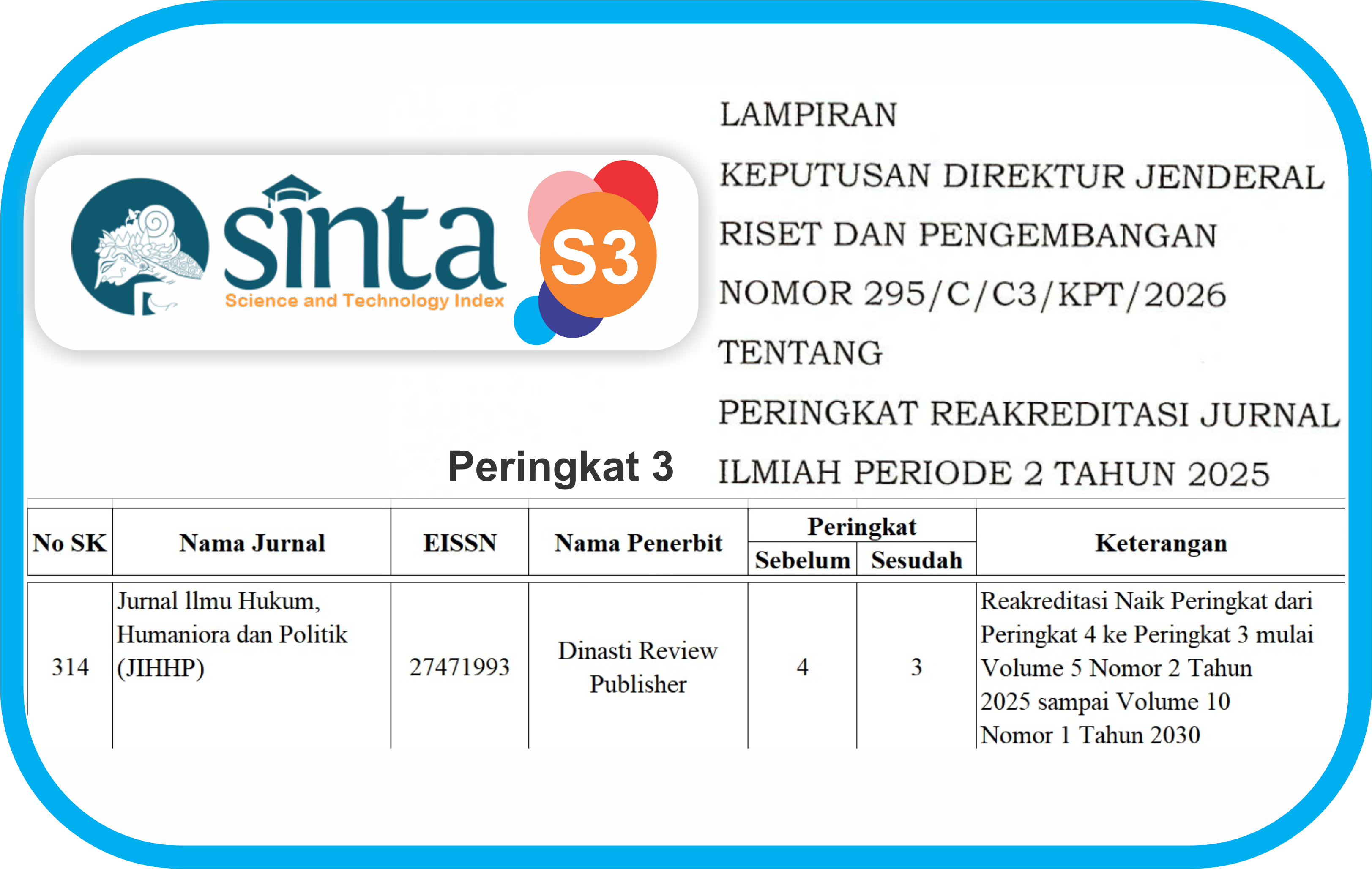Analisis Yuridis Peristiwa Kebocoran Data Daftar Pemilih Tetap Dalam Penyelenggaraan Pemilihan Umum Tahun 2024
DOI:
https://doi.org/10.38035/jihhp.v4i4.2155Keywords:
Data Leakage, Permanent Voter List, Indonesia’s Election 2024Abstract
Recently, the public was shocked by the news of a data breach involving 240 million entries from the permanent voter list. This data was leaked from the official website of the General Elections Commission of the Republic of Indonesia by a hacker using the pseudonym “Jimbo”. The data was sold online on BreachForums for USD 74,000. This incident has raised serious concerns among the public due to its broad potential impact on the confidentiality of citizens' personal information and has prompted new questions regarding the accountability of the General Elections Commission of the Republic of Indonesia as the election organizer. In this research, the researcher employs a normative juridical approach by reviewing secondary data collected through library research and using a case and regulatory approach. Based on the research findings, the protection of personal data by the General Elections Commission of the Republic of Indonesia is not yet optimal, as the regulations held by the General Elections Commission of the Republic of Indonesia are only internally applicable and do not have the legal strength equivalent to laws. These the General Elections Commission of the Republic of Indonesia regulations are only applicable to regional head elections and general elections. Furthermore, it is necessary to enhance literacy on the importance of data so that all members of the General Elections Commission of the Republic of Indonesia understand the mechanisms of data processing, inputting, and processing. The General Elections Commission of the Republic of Indonesia members must determine the types of data that can be published and those that should not be exposed to the public, thus enabling the General Elections Commission of the Republic of Indonesia to fulfill its obligations to protect and be accountable for the data obtained from the public.
References
Alfian Kusnaldi, M., Fadila Syani, N., & Afifah, Y. (2022). Perlindungan Data Pribadi dalam Penyelenggaraan Pemilu: Tantangan dan Tawaran. Jurnal Lex Renaissance, 7(4), 710–725. https://doi.org/10.20885/JLR.vol7.iss4.art3
Aswandi, B., & Roisah, K. (2019). NEGARA HUKUM DAN DEMOKRASI PANCASILA DALAM KAITANNYA DENGAN HAK ASASI MANUSIA (HAM). Jurnal Pembangunan Hukum Indonesia, 1(1), 128–145. https://doi.org/10.14710/jphi.v1i1.128-145
Aswandi, R., Muchin, P. R. N., & Sultan, M. (2020). Perlindungan Data dan Informasi Pribadi Melalui Indonesian Data Protection System (IDPS). Jurnal Legislatif, 3(2), 167–190. https://doi.org/https://doi.org/10.20956/jl.v3i2.14321
Baskhara, P. (2023). Data DPT Pemilu 2024 di Situs Resmi KPU Diretas, Dijual Hacker Jimbo Rp1,1 M, Menkominfo: Diselidiki. Wartakotalive. https://wartakota.tribunnews.com/2023/11/30/data-dpt-pemilu-2024-di-situs-resmi-kpu-diretas-dijual-hacker-jimbo-rp11-m-menkominfo-diselidiki?page=all
BBC News Indonesia. (2023). Ratusan Juta Data Pemilih Dari Situs KPU Diduga Diretas, Apa Akibatnya. BBC News Indonesia. https://www.bbc.com/indonesia/articles/cgxpk9k3ye5o
Ezrachi, A., & Stucke, M. E. (2016). Virtual Competition: The Promise and Perils of the Algorithm-Driven Economy. Harvard University Press.
Hoesein, Z. A., & Arifudin. (2017). Penetapan Pemilih Dalam Sistem Pemilihan Umum (1 ed.). Rajawali Pers.
Karim, S. (2023). Akurasi dan Pemutakhiran Data Pemilih untuk Pemilu 2024. Prokal.co. https://www.prokal.co/kalimantan-timur/1773947858/akurasi-dan-pemutakhiran-data-pemilih-untuk-pemilu-2024
Marzuki, P. M. (2019). Penelitian Hukum: Edisi Revisi (19 ed.). Prenada Media Group.
Matheus, J., & Gunadi, A. (2024). Pembentukan Lembaga Pengawas Perlindungan Data Pribadi Di Era Ekonomi Digital: Kajian Perbandingan Dengan KPPU. JUSTISI, 10(1), 20–35.
Mulyadi, D. (2012). Kebijakan Legislasi Tentang Sanksi Pidana Pemilu Legislatif di Indonesia Dalam Perspektif Demokrasi (1 ed.). Gramata Publishing.
Purbolaksono, A. (2024). Mencegah Kebocoran Data untuk Menjaga Integritas Pemilu 2024. The Indonesian Institute. https://www.theindonesianinstitute.com/mencegah-kebocoran-data-untuk-menjaga-integritas-pemilu-2024/
Rebovich, D. J., Allen, K., & Platt, J. (2015). The New Face of Identity Theft: An Analysis of Federal Case Data For the Years 2008 Through 2013.
Sandrawati, N. A. (2022). Antisipasi Cybercrime dan Kesenjangan Digital dalam Penerapan TIK di KPU. Electoral Governance: Jurnal Tata Kelola Pemilu Indonesia, 3(2), 232–257. https://doi.org/https://doi.org/10.46874/tkp.v3i2.655
Sekretriat Jenderal dan Kepaniteraaan Mahkamah Konstitusi. (2010). Naskah Komprehensif Perubahan Undang-Undang Dasar Negara Republik Indonesia Tahun 1945: Latar Belakang, Proses, dan Hasil Pembahasan 1999-2002. Mahkamah Konstitusi Republik Indonesia.
Soekanto, S. (1984). Pengantar Penelitian Hukum. UI Press.
Soekanto, S., & Mamudji, S. (2006). Penelitian Hukum Normatif (Suatu Tinjauan Singkat). Rajawali Press.
Subarkah, T. (2023). Data Pemilih di KPU Diduga Bocor, Pakar: Bahaya Bagi Pemilu 2024. Media Indonesia. https://mediaindonesia.com/politik-dan-hukum/633610/data-pemilih-di-kpu-diduga-bocor-pakar-bahaya-bagi-pemilu-2024
Sugiyono. (2011). Metode Penelitian Kuantitatif, Kualitatif, dan R&D. Alfabeta.
Tim Privacy International dan ELSAM. (2015). Privasi 101: Panduan Memahami Privasi, Perlindungan Data dan Surveilans Komunikasi (1 ed.). Lembaga Studi dan Advokasi Masyarakat (ELSAM).
Downloads
Published
How to Cite
Issue
Section
License
Copyright (c) 2024 Michael Michael, Rasji Rasji

This work is licensed under a Creative Commons Attribution 4.0 International License.
Hak cipta :
Penulis yang mempublikasikan manuskripnya di jurnal ini menyetujui ketentuan berikut:
- Hak cipta pada setiap artikel adalah milik penulis.
- Penulis mengakui bahwa Jurnal Ilmu Hukum, Humaniora dan Politik (JIHHP) berhak menjadi yang pertama menerbitkan dengan lisensi Creative Commons Attribution 4.0 International (Attribution 4.0 International CC BY 4.0) .
- Penulis dapat mengirimkan artikel secara terpisah, mengatur distribusi non-eksklusif manuskrip yang telah diterbitkan dalam jurnal ini ke versi lain (misalnya, dikirim ke repositori institusi penulis, publikasi ke dalam buku, dll.), dengan mengakui bahwa manuskrip telah diterbitkan pertama kali di JIHHP.















































